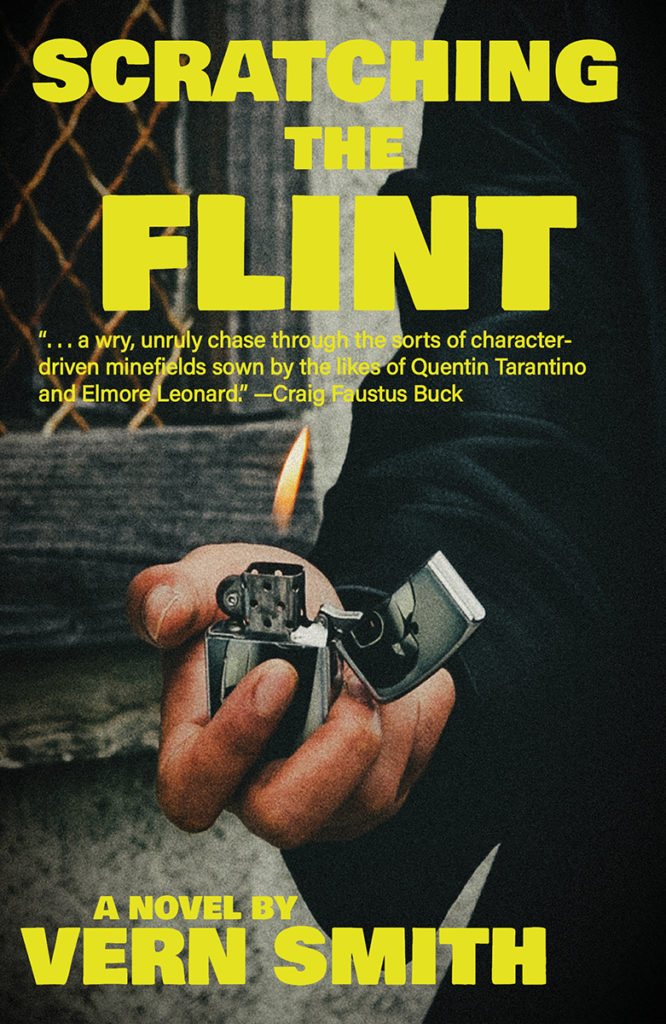Meet Windsor Born and Raised Author Vern Smith
Story by Karen Tinsley
Photography by Debbie James
Noir fiction comprises a marked darkness in theme and subject matter, unfolding against a backdrop of systemic and institutional corruption. Windsor born-and-raised author Vern Smith discusses his newest work, “Scratching the Flint”, which has been awarded “Best Indie Crime Novel of 2023” from Crime Fiction Lover.
Filled with seriously flawed, morally questionable characters, the tone of noir fiction is generally bleak, with protagonists rejecting all moral principles because they believe that life is meaningless; their greed, lust, jealousy, and alienation plunge them into downward spirals as plans and schemes inevitably go awry. People lie, steal, cheat and kill, while becoming increasingly entangled in situations they can’t possibly escape.
On the heels of where “The Gimmick” (Vern Smith’s previous novelette) left off, “Scratching the Flint” features detectives Alex Johnson and Cecil Bolan straining against a broken legal system. With no-nonsense prose and wry humour, Smith takes readers on an exciting ride in this caper that’s fun, suspenseful and serious all at once.

Witnesses are mocked and murdered; evidence becomes a relative term to Detective Bolan. Racked with guilt while the system sputters, Bolan covertly assumes the roles of investigating officer, attorney, judge and executioner.
“Scratching the Flint” follows two of Toronto’s most battle-worn cops as they navigate racism, city hall high jinks, cunning criminals and compromised journalists. Through surprising plot twists and peeling back layers of institutional failure and decay, Smith tells one shockingly candid tale.
Growing up in Windsor, attending Central Public School and Centennial High (now known as Holy Names), Smith studied Communication Studies at the University of Windsor before transferring to what was then known as Ryerson Polytechnical Institute in Toronto. After graduating in 1989, he worked for a handful of newspapers, magazines and radio stations.
In 2010, Windsor’s CJAM radio beckoned Smith back, where he played a pivotal role until 2016.
Vern explains, “My wife was working in Illinois as a tenure-track professor. One of us had to move; we decided it was me.”
That’s when Vern seriously embraced fiction writing; in the past five years, he’s published five books.
When asked who or what inspired him, Smith shares, “’Dopefiend’” by Donald Goines is a heavy story that was close to home geographically; I found it fascinating. Goines was writing about Detroit; his unsanitized style was worlds away from my reality. I mean, Windsor has always been a tough-assed town, but Detroit’s in a whole other league.”
Smith was also deeply inspired by Canadian author Evelyn Lau’s critically and commercially successful “Runaway: Diary of a Street Kid”, a brutally frank memoir chronicling teenaged Lau’s life on the streets of Vancouver’s notorious Downtown East Side.
He also recalls devouring “Go-Boy! Memories of a Life Behind Bars”, Roger Caron’s influential prison memoir.

When it was published, Caron was 39 years old and had spent 23 years of his life in prison.
“I guess you could say I established a different foundation because these works were non-fiction, not Mickey Spillane novels. ‘Freaky Deaky’ was the first Elmore Leonard novel I read; that book introduced me to genre-style noir fiction. These writers and a few others set the table for me.”
Smith’s 2003 “The Gimmick” was shortlisted for the Arthur Ellis Award, which recognize the best in Canadian crime writing.
With respect to the writing process, is Vern a plotter or a by-the-seat-of-his-pantser?
“I think I was initially a pantser but then became a plotter; my first novel The Green Ghetto is about the war on drugs, terror, and words. I spent the next six months whittling it down, which was a painful process.”
Remembering when he interviewed Mickey Spillane many years ago, Smith says, “One of the things he said was, ‘know how it ends before you begin’. Originally, ‘Scratching the Flint’ was a short story. After setting it aside for 10 years, I could see what needed changing. So, I reworked it methodically, setting up all my chapters (even if they only contained one or two sentences). And it just kept growing. I thought to myself, I have the perfect novel here, I’m not going to squander it into a short story.”
Confiding that “Scratching the Flint” was his pandemic project, Vern laughs, “it was incredibly liberating, because it seemed there was no need to censor myself when I could die of COVID.”
For this author, what makes a great story?
“Speaking as a former journalist, the greatest story is the one they don’t want you to write! But generally, I think the greatest stories are simple stories, told well.”
In “Scratching the Flint”, did Smith have a favourite character?
He shares, “I had a lot of fun with Alex and Cecil. Both are deeply flawed; it was so interesting getting into their heads. While neither of them could be called a hero or role model, they were a lot of fun to be around.”
What about a favourite female character?
“Sometimes my characters are based on real people; in ‘Scratching the Flint’, The Greek was a real bar in Toronto’s Kensington Market that I visited myself. A woman sitting beside me introduced herself as Venus de Milo. With that moniker, it was no surprise she was a prostitute. We spent a lovely, innocent, fun couple of hours watching the ball game on the bar TV. I was delighted to portray Venus fictionally.”
What kind of readers will enjoy “Scratching the Flint”?
“Readers who want unsanitized stories. Readers who want to read about how the world really is, not how it should be. Readers who identify with Windsor and Toronto. Readers who understand and appreciate that the story may not end the way they want.”
Vern’s next project is a “departure” from his previous work, but that’s all he’s prepared to share right now.
To conclude, we asked Vern which authors (living or dead) he would invite for cocktails: “Evelyn Lau, John Rechy, Brent Easton Ellis, Donald Goines, Iceberg Slim and Dorothy Parker. I almost included Charles Bukowski but thought better of it.”




Add comment